Eco-Cha Tea Club
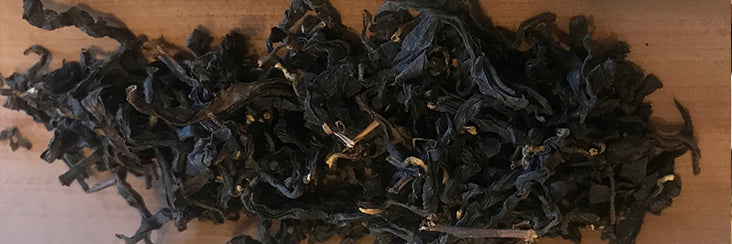
Jin Xuan GABA Black Tea Tasting Notes | Eco-Cha Tea Club
Mr. Xie has been producing significant quantities of GABA Oolong Tea for several years, but this is the first batch of GABA tea that he processed as a Black Tea. After sharing his hand-picked, naturally farmed GABA Oolong that had been aged for a full year last July, we are excited to share this batch that was harvested last June, and aged 9 months. While these time periods do not qualify as "aging" tea, they do allow the composition of the leaves to mellow and offer a richer, more full-bodied character.
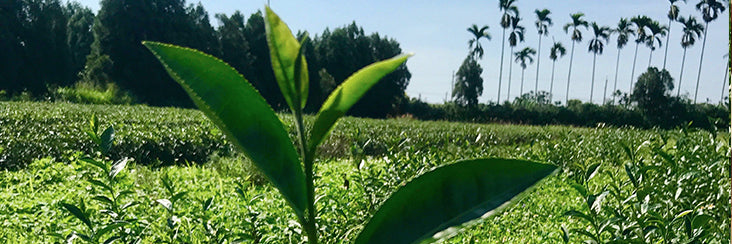
Jin Xuan GABA Black Tea | Eco-Cha Tea Club
After years of honing his GABA tea making skills using Oolong processing methods, Mr. Xie decided to process this harvest as a GABA Black Tea for the first time. The entire harvest amounted to less than 20 kg, and by the time we found out about it, there was barely enough to be shared with our Tea Club members!
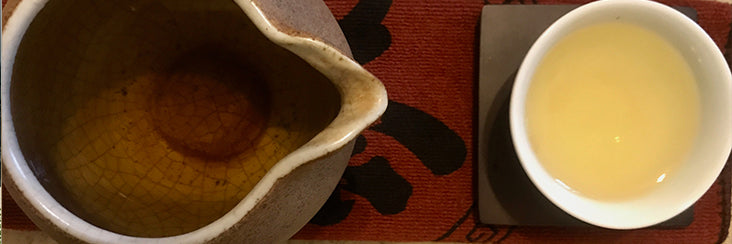
Light Roast Concubine Oolong Tasting Notes | Eco-Cha Tea Club
We were captivated by the flavor profile with the first sip when our mentor Lisa Lin brewed for us on an impromptu visit to her home. It's vibrant, fresh, complex, and also smooth and balanced. Its overall profile carries delicate floral aromatic notes, and a distinct honey-like flavor suspended in a thick, smooth composition. The most distinctive aspect of this batch is that it maintains a very fresh character while having no green vegetal or herbal qualities. It's an amazing balance of delicate floweriness and freshly baked scones. In sum, it's a proper tribute to the magic of bug bitten tea!
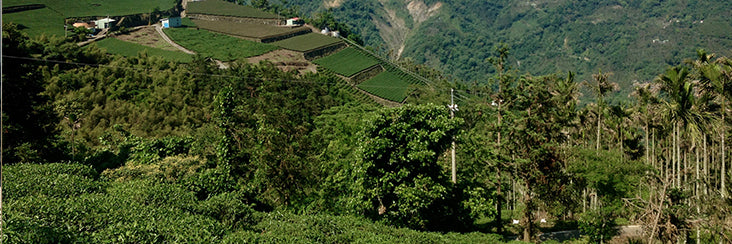
Light Roast Concubine Oolong Tea | Eco-Cha Tea Club
Andy visited the farm a second time because the older brother had told him that he had transitioned his own plots of tea to completely natural farming, i.e. not using any chemical pesticides or fertilizers. The image above clearly shows the contrast of a transitional plot of tea in the foreground, compared to the commercially farmed plots of tea on the neighboring farm below in the background.
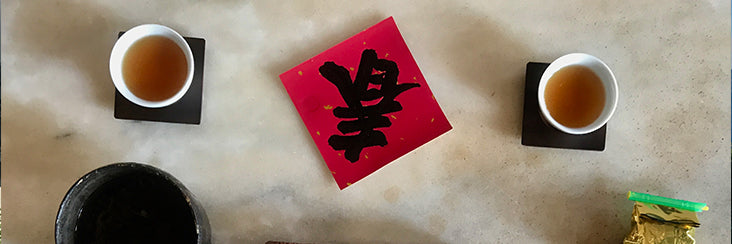
Qing Xin Oolong Black Tea Tasting Notes | Eco-Cha Tea Club
In addition to the name of the tea strain, this batch of tea was made by an artisan of Dong Ding Oolong Tea with his family plot of heirloom tea trees. He incorporated Oolong Tea methods in the very first step of solar withering, and the very last step of tightly rolling the tea leaves. So the raw material of the summer crop of heirloom Qing Xin Oolong tea leaves, processed by an Oolong Tea maker by trade offers us this superior quality Black Tea.
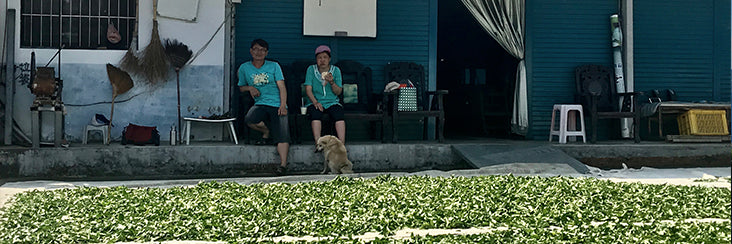
Qing Xin Oolong Black Tea | Eco-Cha Tea Club
We chose the name "Qing Xin Oolong Black Tea" in accordance with the local terminology, which would be simply "Oolong Black Tea" (烏龍紅茶). But because in English, Oolong is the name given to partially oxidized teas, we added the Chinese pinyin of this traditional strain of tea plant that originated in mainland China. Qing Xin literally means "green heart" which describes the appearance of the stem of the leaf.
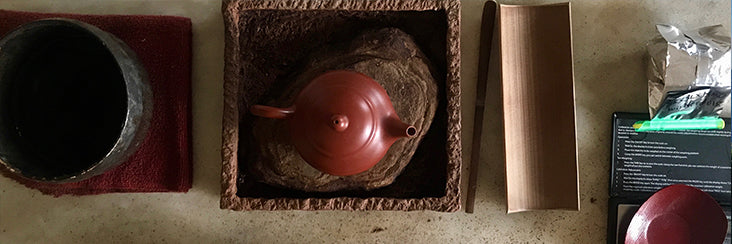
Long Feng Xia High Mountain Oolong Tea Tasting Notes | Eco-Cha Tea Club
Batch #38 of the Eco-Cha Tea Club is kicking off 2019 with a cutting edge rendition of Taiwanese High Mountain Oolong Tea. We're inspired to share this batch of tea because of its differentiating value from the conventional market grade High Mountain Tea that has become well known in Taiwan and beyond.
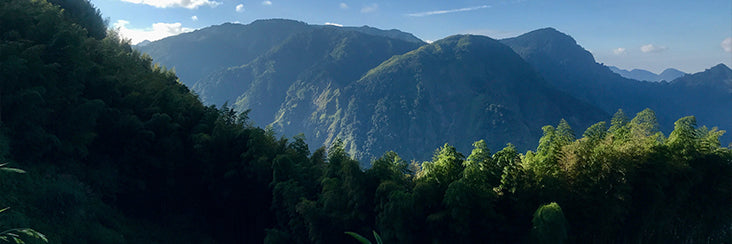
Long Feng Xia High Mountain Oolong Tea | Eco-Cha Tea Club
Long Feng Xia (龍鳳峽) or Dragon Phoenix Gorge is a deep river valley on the south side of the Shan Lin Xi High Mountain Tea growing region. Long Feng Xia is also the place name of the ridge overlooking this gorge, and is well known in Taiwan as the source of some of the best quality Shan Lin Xi High Mountain Oolong Tea.
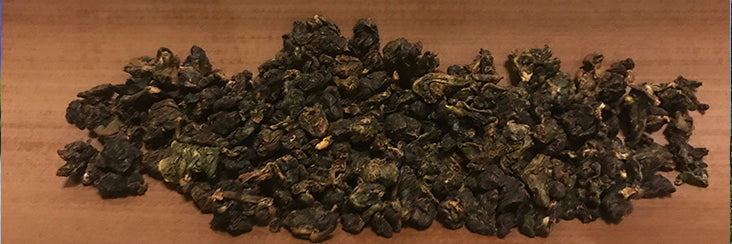
Red Oolong Tea Tasting Notes | Eco-Cha Tea Club
Appearance of the dried leaves is the first step in assessing any loose leaf tea. We can see by the coloration that these leaves are partially oxidized, with both green hues and darker tones. This is the first sign that it is a traditionally made Oolong tea. In recent trends, tea made in this fashion has been given the name "hong Oolong" or Red Oolong. It's actually just a new name for an old recipe.
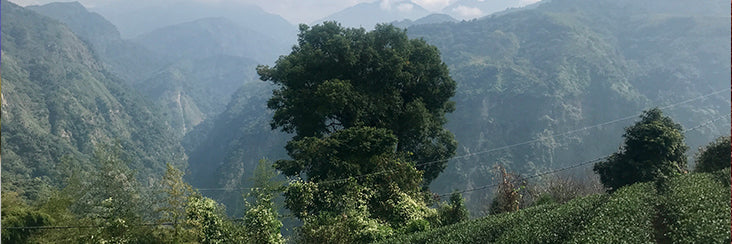
Red Oolong Tea | Eco-Cha Tea Club
This is what inspired us to share this batch of tea that was produced in Nantou County. We consider this batch of tea to be properly named Red Oolong, simply because the leaves are obviously only partially oxidized. The flavor of the tea has aspects of a Black Tea character while maintaining the fragrant, aromatic complexity of an Oolong.
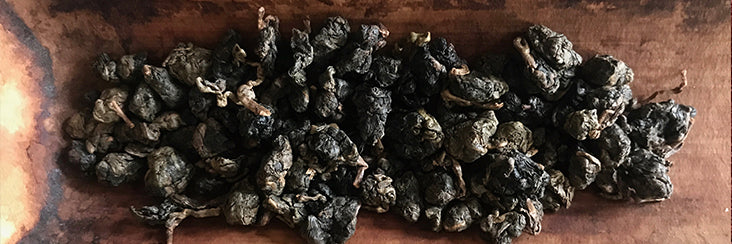
Fo Shou Oolong Tea Tasting Notes | Eco-Cha Tea Club
Fo Shou, or Buddha Hand, is a traditionally made Oolong Tea with deep roots — literally. This name refers to a large-leaf strain of tea, putting in the same category as Wild Tea, Assam, and Red Jade #18. Large-leaf strains are a category that is distinctly separate from the majority of small-leaf tea strains cultivated for Chinese Oolong, Green and Black Tea production.
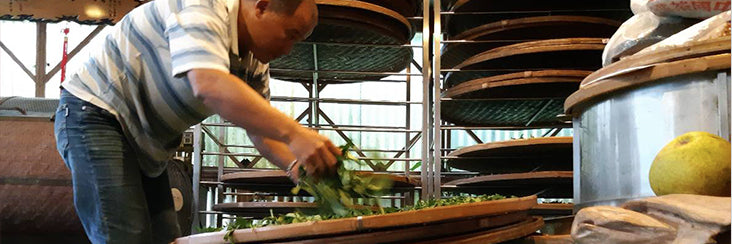
Fo Shou Oolong Tea | Eco-Cha Tea Club
This month, we are celebrating the third anniversary of the Eco-Cha Tea Club by sharing a batch of Fo Shou Oolong Tea for the very first time. The Chinese Fo Shou (佛手) means Buddha Hand. The name refers to the tea plant, or cultivar, which classifies as a large leaf type. This puts it in the category of Assam, and wild strains of tea, along with the Taiwanese hybrid cultivar — Red Jade #18. Despite the fact that virtually all large leaf type strains of tea are cultivated for Black Tea production in Taiwan, Fo Shou has found its unique niche in the making of (partially oxidized) Oolong Tea. Similar to its predecessor in mainland China, this batch of Fo Shou was made in the fashion of traditionally made Tie Guan Yin from Mu Zha, Taiwan.

